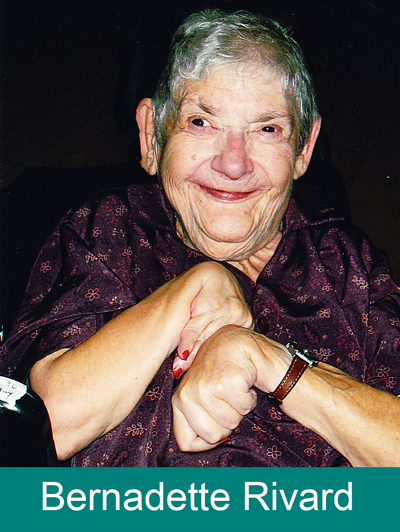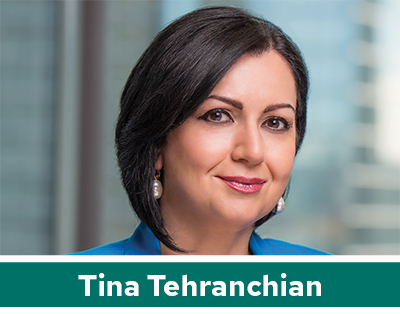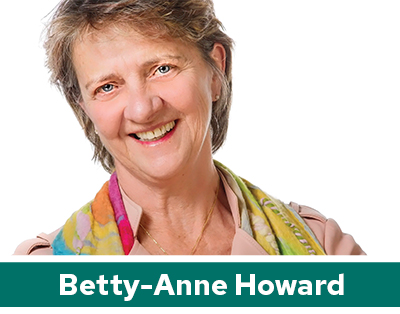Meet our 2021 National Ambassador – Alvin Law
Alvin is living proof that we should all remove the word can’t from our vocabularies. The thalidomide survivor, musician, author, fundraiser and motivational speaker has inspired more than two million people on five continents to reach their full potential in life.
People who don’t know Alvin can make assumptions - he was born without arms - but he’s never let labels define or limit him. He encourages others to do the same by being accountable and embracing the choices they have. He empowers us all to let go of unhelpful attitudes and rethink our roles, abilities and lives.
Find out more about
Alvin’s journey here.
Bernadette Rivard: A life-long journey

Bernadette Rivard was born with cerebral palsy. She lived at home until she was 32, when her mother could no longer meet her care needs. That’s when Bernadette moved into Pioneer Manor, a long-term care residence in Sudbury, Ontario. Her mother passed away five years later, and Bernadette continued to call Pioneer Manor Home.
Over the years, Bernadette had newer manual wheelchairs that she used to get around. Her needs changed as she got older though and, in 2005, a physiotherapist assessed her to determine if she could safely operate a motorized wheelchair. The spasticity in her hands meant Bernadette couldn’t use hand controls, but she could use her head to operate controls in her headrest.
Unfortunately, the cost was a problem. Bernadette’s disability pension could barely meet her basic needs - it certainly didn’t stretch to a motorized wheelchair with head controls. The mobility clinic at the local hospital encouraged Bernadette to contact the Cerebral Palsy Foundation and March of Dimes Canada for financial support, which she did. She also reached out to service clubs and churches for help. It worked.
Once she had the money, Bernadette sat through several fittings and adjustments before receiving her first motorized wheelchair at the age of 75 years!
Suddenly, Bernadette could get to the dining room for dinner and back to her room in time to watch her favourite TV show. She was able to make appointments to get her hair cut and attend events like bingo games and church services all on her own. She could visit friends or enjoy fresh air on the patio. She could listen to birds in the garden. And for the first time in her life, she didn’t need help to do any of it.
She was overjoyed.
Five years later, when Bernadette was 80, her wheelchair needed to be replaced. Once again, she tapped into March of Dimes Canada’s Sudbury office and other service providers to cover the cost and direct her to local sources who could help. By 2011, she had a whole new wheelchair.
Bernadette’s sister moved into Pioneer Manor, too, so they would check on each other every morning, visit every afternoon, and motor around the residence to see what was going on. Bernadette’s chair gave her independence and mobility until she passed away in 2014.
The RRSP and RRIF beneficiary designation solution
Written by: Tina Tehranchian

The Canadian tax system provides generous tax credits for charitable donations. The reason the government provides these generous tax incentives and foregoes the tax revenue is to encourage Canadians to donate more to charities of their choice. Charities can harness the time and efforts of millions of volunteers and the voluntary donations of Canadians and achieve more than would be possible for our government to do merely by collecting taxes.
While like most Canadians you may donate to charities because you have a personal connection to the cause, want to make a difference and give back to your community, it is important that you take advantage of the tax incentives for charitable donations to maximize the impact of your donations during your lifetime and multiply your bequests. RRSPs and RRIFs are a great way of saving for retirement on a tax deferred basis. You receive a tax deduction on the amounts that you contribute during your lifetime, the funds will grow tax sheltered until you withdraw them or age 71 at which time you must convert your RRSP to a Registered Retirement Income Fund (RRIF) and start withdrawing income from it and pay tax on the income.
However, RRSPs and RRIFs are the worst way to transfer wealth to the next generation and are a ticking time bomb when it comes to taxes. Upon the death of the first spouse the entire balance of an RRSP or RRIF will be rolled over on a tax-free basis to the surviving spouse. The problem occurs on the death of the second spouse. At that time the balance of the RRSP or RRIF is considered income in the year of death and will likely put the estate of the last spouse in the highest tax bracket. In 2019 in Ontario any income over $220,000 is taxed at the highest marginal tax rate of 53.53%. Therefore, even if the last spouse to die has no other income in the year of death, a modest RRSP or RRIF balance could easily put him/her in the highest marginal tax bracket.
One strategy that can help you leave a legacy to your charity of choice and maximize the amount of the total after-tax combined bequest and inheritance for your children is designating the charity (or charities) of your choice as one of the beneficiaries of your RRIF. This strategy would work in all provinces except for Quebec.
Let’s consider the case of Mary, a very philanthropic retiree, to see how by using the 50% strategy, she can leave a generous charitable bequest to ensure that the charity she has supported all her life will receive a bequest from her with minimal reduction in the inheritance she wishes to leave for her children.
Mary is a 60-year-old widow and has $500,000 in her RRIF. She is using the income from her RRIF to support her lifestyle. She has been a homemaker all her life and has no other source of income. If she dies in 2019, she would end up paying approximately $230,000 in taxes on her death on her RRIF, leaving her beneficiaries with only $270,000 after tax.
If she changes the beneficiary designation of her RRIF and appoints her favourite charity as beneficiary for 50% of the assets ($250,000) and leaves the other 50% or $250,000 to her children. By naming the charity as a 50% beneficiary of her RRIF, Mary can leave a $250,000 bequest for her favourite charity and the inheritance she is leaving her beneficiaries is only shrinking by $125,000 ($270,000 – $145,000).
Therefore, the $250,000 legacy gift has only cost her estate $125,000 and the inheritance she will leave to her beneficiaries is only reduced by this amount. Furthermore, the total after-tax inheritance and bequest that she would be leaving would be $395,000 versus only $270,000 if her children were the only beneficiaries of her RRIF.
Designating charities as beneficiaries of your RRSP or RRIF is a very quick and simple solution that can be implemented by completing a multiple beneficiary designation form with the financial institution where your RRSP or RRIF is held. It is a very flexible solution as you can change your mind and the amount that you wish to leave to each charity as often as you like without the need to update your will and thus allows you to save on the expenses involved.
A direct beneficiary designation will also mean that the money that goes to the named beneficiaries will bypass your will and will not be considered part of your estate. Therefore, the amount would not be subject to the 1.5% estate administration tax in Ontario, which is charged on estate assets over $50,000.
While the RRSP/RRIF beneficiary designation strategy can be a very powerful strategy for maximizing the impact of your philanthropy and your charitable bequests, it needs to be taken into consideration in the context of your overall financial and estate planning.
Therefore, consult a qualified CFP professional who specializes in philanthropic tax planning before implementing this strategy.
Giving back to March of Dimes Canada
Ada Carter understood the enormous impact that MODC can have – her daughter, Jayne, lived in one of our supportive housing locations in Sarnia for twenty years.
Jayne was born with cerebral palsy. Ada and her husband Harold adopted the days-old infant knowing that it would be a life-long commitment. Harold became an outspoken advocate for the rights of people living with disabilities, and an active member of the community along with Jayne. As a family, they enjoyed travelling and visited England several times to see relatives.
During her time with us, we supported all Jayne’s tasks of daily living. It meant that her parents didn’t have to be her caregivers – they could enjoy spending time with their daughter without worrying about her personal care.
That’s why Ada left MODC a significant bequest in her will. She wanted to support our work, and this was an easy and effective way to do that. Generous people like Ada help ensure that others can benefit from our programs and services in the future.
Legacy gifts are essential to sustaining the work we do, and they’re easy to include in your will. Once you’ve provided for your loved ones, choose a charity you believe in and leave whatever amount you feel is appropriate.
It’s a way of imparting dignity, meaning and purpose on a well-lived life while supporting a good cause. Whether you want to donate one last time, or for the first time, legacy gifts can make a big difference. Your values and generosity will live on in charity you support.
For further information on planned giving:
Planned Giving Department
March of Dimes Canada
(416) 425-3463
1-800-263-3463
Creating a lasting charitable legacy
Everyone needs a will. Unfortunately, the majority of Canadian adults don’t have one, or they have one that’s out of date. We all think there’s plenty of time so it sits on our to-do list year after year.
Why is that a concern? A will lets you make the best decisions for you and your loved ones. You get to distribute your money and belongings as you see fit and chose someone to carry out your wishes. Dying intestate – without a will – leaves those decisions to rules set out by provincial and territorial governments. And while the rules are different in each jurisdiction, they won’t reflect your wishes.
Consider a charity that means a lot to you - maybe one you have a personal connection to. By writing a will, you can support that cause in a meaningful way. Donating even a tiny percentage of your estate can be more significant than all your annual contributions combined!
Charities like March of Dimes Canada benefit tremendously from those legacy gifts, which can be used to create long-term grants like the Istvan and Barbara Haas Fund.
Unfortunately, when someone dies intestate, nothing is allocated to charity. It’s a missed opportunity to make a difference and create a lasting charitable legacy.
I often saw people struggle to write a will when I practiced as an estate planning lawyer. And that’s why I started Epilogue. I wanted to create a simple and affordable way for Canadians to create basic wills, make the best decisions for their loved ones, and support the great work of charities like March of Dimes Canada.
If you’d like to update your will, or make a new one, please visit Epilogue and click “Get Started.” Be sure to use discount code MODC20 for $20 off your planning documents (offer expires Aug. 31, 2021).
Arin Klug is a tax and estate planning lawyer who started Epilogue in 2019 with the goal of using technology to give Canadians a simple and affordable way to create their own, basic estate planning documents. Epilogue is not a law firm and does not provide any legal advice.
The Registered Disability Savings Plan (RDSP) Explained: Myths, Facts, and Financial Planning Strategies [Part 1 of a 4-Part Series] Written by: Betty-Anne Howard and Jackie Power

In her brilliant book "Disfigured: On Fairy Tales, Disability and Making Space", Amanda Leduc uses a vastly different lens to discuss the needs of the disability community, and the extent to which society has to change to remove the many barriers facing people with disabilities in our communities.
Her approach, with which we wholeheartedly agree, is that we need to recognize our responsibility to everyone in our society, "up to and including the need to consider how best to meet the varying needs of different bodies".
The stories we have been told, the narratives we've heard and shared about people with disabilities, need to evolve into "narratives that change the world so everyone can win."
In addition to the social barriers members of the disability community constantly face, there are severe economic and financial barriers. We want to share some methods, mechanisms, and investment vehicles that can help to address these barriers.
We recognize that financial services (the world we work in) can be intimidating, alienating, and difficult to understand, and we want to change that with this series of articles.
We want to demystify the financial vehicles available to you with the hope of helping you gain better access to these tools, starting with the myths and misconceptions we have encountered throughout our combined almost half a century of helping Canadians sort out the best way forward to address their needs both now and in the future.
Myths and Misconceptions
In the first installment of our series, let's look at some common myths and misconceptions:
Myth #1 - You have to be a minor to set up an RDSP
Betty-Anne:
Jackie, you mentioned that when it comes to setting up the investment vehicle intended to help support individuals and families who have disabilities (ie - a Registered Disability Savings Plan, or RDSP), the most common misconception is that it's only for minors?
Jackie:
I've had conversations with people who didn't realize that they didn't have to be a minor to be eligible or even to benefit from a RDSP. This is an excellent account type that in my opinion is underutilized by Canadians because many people who are eligible simply don't realize they could set up an account.
Betty-Anne:
Yes, there seems to be a lot of confusion about who is eligible for an RDSP plan, We have a range in ages for the families who we've set these up from an 8 year-old to a 40-year-old, for example. What is the cut-off age?
Jackie:
An individual can set up an RDSP until December 31st of the year they turn 59. A beneficiary is eligible for a grant and/or bond up until December 31st of the year they turn 49.
Myth #2 - If you're working, you're not eligible for the RDSP
Jackie:
Many people believe that if they are working, they're not eligible for the RDSP grant, and that is simply not the case. You can work full time and be able to open an RDSP grant as long as you meet the eligibility requirements.
The RDSP Canada eligibility requirements are:
- You must be eligible for the Disability Tax Credit (DTC)
- You must be a Canadian resident
- You must have a valid social insurance number
- You can open your RDSP until December 31st of the year you turn 59
Myth #3 - If you qualify for the Ontario Disability Support Program (ODSP) you automatically also qualify for the Disability Tax Credit (DTC)
Betty-Anne:
The Ontario Disability Support Program seems to be another area that people get confused by. How does it fit in with the Disability Tax Credit, and what are the common misconceptions?
Jackie:
Many people believe that if they are eligible for the ODSP they will automatically be eligible for the DTC and that is simply not the case. Generally, it's harder to get the DTC than it is to get the ODSP.
With that said, the 2021 Budget has proposed to widen the qualifications defining mental capacity and functions, as well as life-sustaining therapy which will increase the number of Canadians who will qualify for the DTC.
What's next in this series?
Obviously, the RDSP is complex and has a lot of moving parts, and this information is just the tip of the iceberg. This article and the next one are designed to help clear up some of the misconceptions people have about the RDSP.
Part 2 will discuss the myths and misconceptions about withdrawals from an RDSP and what happens when a beneficiary is no longer eligible for the DTC.
The 3rd and 4th articles in our series will discuss disability benefits, tax relief, and strategic financial planning.
Stay tuned!
Jackie Power is Assistant Vice President, Tax and Estate Planning at Mackenzie Investments. Jackie joined the team as a Bilingual Specialist in 2011 and has been with Mackenzie Investments for over 20 years.
Betty-Anne Howard is an award-winning Certified Philanthropic Financial Planner, Author and Speaker who specializes in helping women and couples make their dreams a reality through financial planning and charitable giving. Learn more about Betty-Anne here:
www.bettyannehoward.com

Your will may be the most important legacy you leave. Not writing one, or not having a current will, is a common mistake that means you don't control who inherits your estate, or who executes your wishes. More importantly, it shifts the burden of that responsibility onto your loved ones.
Fortunately, it's a mistake that's also easy to fix.
If you're organizing your estate and writing a will, you're probably wondering how to distribute your assets. You'll be thinking about children, siblings, parents, other close relatives, friends. You should also be considering charities.
March of Dimes Canada receives a significant amount of money from legacy gifts – they make a big difference to our work and the people we support. That's why we've partnered with Willfora, Canada's first free resource that allows you to create a legal will online in less than 20 minutes. Willfora also makes it easy to support causes that are important to you, which we hope is one of your goals when you're making your bequests.
What if you change your mind later? No problem. Willfora's confidential, secure platform allows you to update your will as easily as you created it. You can take care of your loved ones while empowering ability across Canada by supporting our work. What a remarkable legacy.
Visit
https://give.willfora.com/charities/march-of-dimes-canada to claim your free Will today.
For more information contact:
Planned Giving Department
March of Dimes Canada
(416) 425-3463
1-800-263-3463
